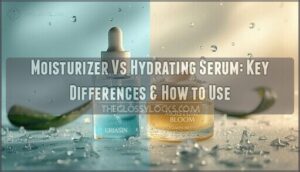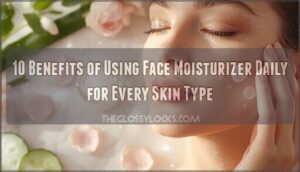This site is supported by our readers. We may earn a commission, at no cost to you, if you purchase through links.

Clay and purifying masks work best before showering, when your pores are tight and the mask can effectively pull out impurities without steam interference.
Hydrating and nourishing masks, however, shine after your shower when warm water has opened your pores and softened your skin for better ingredient absorption.
Think of it like prepping a surface before painting—you wouldn’t apply primer and paint simultaneously.
Your skin type also plays a role in this timing game, and understanding these nuances can mean the difference between mediocre results and that coveted post-mask glow.
Table Of Contents
- Key Takeaways
- Benefits of Face Masks Before and After Shower
- When to Apply Face Masks: Pre or Post Shower?
- Best Time to Use Face Masks: Morning or Evening?
- Face Mask Application: Pre-Shower Routine
- Face Mask Application: Post-Shower Skincare
- Tips for Maximizing Face Mask Benefits
- Frequently Asked Questions (FAQs)
- Do you face mask before or after a shower?
- Do you do a face mask first or wash your face first?
- What is the best time to use a face mask?
- Should I wash my face before or after a shower?
- Should you face mask before or after a shower?
- Should I use mask before or after wash?
- Is it better to do an eye mask before or after a shower?
- Can I use a mask after exfoliating?
- How long should masks stay on?
- Are certain masks better in hot weather?
- Conclusion
Key Takeaways
- Apply clay and purifying masks before showering – You’ll get better deep pore cleansing when your pores are tight, and the upcoming steam will help rinse away impurities more effectively.
- Use hydrating and anti-aging masks after showering – You’ll maximize ingredient absorption since warm water opens your pores and softens your skin, creating ideal conditions for moisture retention.
- Match your timing to your skin type – If you’ve got oily skin, post-shower clay masks work best for deep cleansing, while dry skin benefits from pre-shower hydrating treatments to lock in moisture.
- Always cleanse your face first, regardless of timing – You’ll need clean skin for any mask to work effectively, whether you’re applying it before or after your shower routine.
Benefits of Face Masks Before and After Shower
You’ll find that timing your face mask application around your shower can dramatically improve your skincare results, whether you choose to apply before or after.
The warm shower water opens your pores, which enhances ingredient absorption when you apply masks afterward, while pre-shower application allows steam to help draw out impurities more effectively, leading to better skincare results.
Deep Pore Cleansing
Deep pore cleansing becomes your skin’s best friend when you’re deciding between a face mask before shower or face mask after shower.
Clay and charcoal masks excel at deep cleansing by drawing out impurities and blackhead prevention through powerful cleansing ingredients. You can find a deep cleansing mask online for purchase.
- Controls excess oil production
- Removes dead skin cells effectively
- Tightens enlarged pores naturally
These pore strip alternatives work as gentle extraction methods.
Timing for Different Masks
Different mask types require strategic timing based on your skin goals and shower effects.
Clay masks work best before showering since warm water helps rinse away impurities. Hydrating masks shine after showering when open pores boost ingredient absorption.
Anti-aging treatments also benefit from post-shower application. Incorporating them can enhance your skincare routine effectiveness.
When to apply face mask depends on routine integration and desired results.
Optimal Mask Absorption
Timing matters when maximizing face mask benefits through ideal ingredient delivery.
Pre-shower application works best for deep skin cleansing, allowing masks to draw out impurities before steam opens your pores.
Post-shower timing enhances product penetration since warm water increases pore size, creating better mask occlusion.
Your skin prep determines absorption rates—hydrating masks penetrate deeper on damp, warm skin, while clay masks work effectively on dry skin before showering.
For sensitive skin, consider using dairy-based face masks to soothe and rejuvenate.
When to Apply Face Masks: Pre or Post Shower?
The timing of your face mask application depends largely on your skin type and the specific mask you’re using, with different formulations working better before or after your shower.
Understanding when to apply your mask can substantially improve its effectiveness, as warm shower water opens your pores and affects how well your skin absorbs the active ingredients, which is crucial for maximizing the mask’s absorbs benefits.
Oily Skin and Hydrating Masks
When you have oily skin, the Hydration Paradox means you still need moisture despite excess sebum.
Gel-based hydrating masks work best after showering since warm water opens pores for better mask ingredients absorption. These lightweight formulas strengthen your skin barrier without clogging pores.
For enhanced hydration, consider masks with hyaluronic acid ingredients. Application techniques matter—wait five minutes post-shower before applying your hydrating mask for ideal skin hydration.
Sensitive and Anti-aging Masks
Sensitive skin requires extra care when choosing face mask timing and ingredients. Post-shower application works best since warm water opens pores for better absorption of gentle, soothing formulas.
For ideal results with sensitive skin and antiaging concerns:
- Application Frequency: Use masks once weekly to prevent overwhelming delicate skin
- Mask Ingredients: Choose aloe vera, chamomile, or hyaluronic acid for gentle nourishment
- Overnight Masks: Apply antiaging treatments before bed for maximum skin sensitivity protection.
Many users find that using hypoallergenic ingredients helps minimize irritation.
Best Time to Use Face Masks: Morning or Evening?
Beyond choosing pre or post-shower timing, your skin’s circadian rhythm plays a key role in face mask effectiveness. Morning masking works best for hydrating treatments that’ll give you that coveted glow before makeup application.
Your skin craves moisture after overnight repair cycles. Many people find hydrating masks ideal for their morning routine.
Evening masks shine with exfoliating or anti-aging formulas. Your skin enters recovery mode at night, making it perfect for stronger active ingredients. Lifestyle factors matter too – if you’re rushing mornings, stick to quick evening routines.
Masking consistency trumps perfect timing every time. Whether you’re team sunrise or sunset, regular use beats sporadic perfect timing.
Face Mask Application: Pre-Shower Routine
Starting your skincare routine before you shower can transform your results. When you apply a face mask before shower time, you’re setting yourself up for maximum benefit. The upcoming steam works like your skin’s personal assistant, opening pores and helping with impurity removal.
Your preshower face mask routine should begin with clean skin. Remove makeup and surface dirt so your mask can work effectively. Next, apply your chosen mask in a thin, even layer, avoiding your eyes and lips.
Here’s what happens next:
- Steam softens your skin, making mask adherence stronger and more effective
- Pore opening occurs naturally, allowing deeper cleansing of embedded dirt and oil
- Time efficiency doubles as shower steam helps break down the mask for easier removal
Consider using dairy based masks to rejuvenate and cleanse. Leave most masks on for 5-20 minutes. Face mask application tips like these maximize steam benefits while you prepare for your shower.
Face Mask Application: Post-Shower Skincare
Something magical happens when you apply a face mask right after stepping out of the shower. Your warm, damp skin becomes a perfect canvas for maximum ingredient absorption, making this timing ideal for hydrating and anti-aging treatments.
Something magical happens when warm, steamy skin meets the perfect face mask—pure skincare bliss awaits.
The steam from your shower opens pores and softens skin, creating perfect conditions for moisture retention and skin tightening benefits.
Here’s your postshower face mask routine:
- Pat skin dry with a clean towel, leaving it slightly damp
- Apply toner to balance pH and prep for better product compatibility
- Smooth mask evenly across face and neck, avoiding delicate eye areas
- Relax for 15-20 minutes while active ingredients work their magic
- Rinse with lukewarm water and seal with your favorite moisturizer
This shower skincare routine enhances routine integration by combining cleansing with treatment. Following proper face mask application tips helps you maximize every skincare step for healthier, more radiant skin.
Tips for Maximizing Face Mask Benefits
Getting the most from your face mask requires understanding your skin’s unique needs and timing your application correctly.
You’ll achieve better results when you match your mask type to your skin concerns and apply it at the best time, whether that’s before or after your shower.
Pre-Shower Mask Benefits
Maximize your face mask’s potential by applying it before showering.
The steam benefits create perfect conditions for pore opening, allowing deeper oil extraction and pollutant removal.
This preshower routine reduces inflammation while prepping your skin for thorough cleansing.
Clay and exfoliating masks work exceptionally well with this timing, as the warm water effortlessly rinses away impurities afterward, utilizing the steam benefits.
Post-Shower Mask Application
Post-shower face mask application creates the perfect storm for ingredient absorption.
Your pores open from warm water, allowing deeper penetration for pore minimization and hydration lock-in.
This timing reduces skin sensitivity and guarantees product compatibility within your skincare routine order.
Postshower application maximizes your skin care routine effectiveness, delivering concentrated benefits when your skin’s most receptive.
To enhance this routine, consider incorporating broad-spectrum sunscreen options to protect your skin afterward.
Skin Type Considerations
Your skin type acts as your personal roadmap for choosing the perfect mask timing. Oily skin thrives with clay masks after showering, while dry skin needs hydrating treatments beforehand. Sensitive skin requires gentler approaches, and combination skin may need targeted solutions.
Your skin whispers its needs—listen carefully and time your masks accordingly for maximum glow.
- Oily skin: Clay masks post-shower for deep pore cleansing
- Dry skin: Hydrating masks before showering to lock moisture
- Sensitive skin: Gentle masks once weekly with minimal ingredients
- Combination skin: Target different areas with appropriate mask types
- Mature skin: Anti-aging masks several times weekly for best results
Frequently Asked Questions (FAQs)
Do you face mask before or after a shower?
Maya applies her clay mask after her evening shower when her pores are open from the warm steam.
You’ll get better absorption and deeper cleansing by applying most face masks after showering, when your skin’s prepped and receptive.
Do you do a face mask first or wash your face first?
You should wash your face first, then apply the mask.
Clean skin allows better absorption of the mask’s ingredients.
Think of it like prepping a canvas before painting—you’ll get much better results.
What is the best time to use a face mask?
Picture yourself winding down after a long day, ready to pamper your skin.
You’ll get the best results applying face masks after showering when your pores are open and receptive to those nourishing ingredients.
Should I wash my face before or after a shower?
You should wash your face before showering to remove makeup, dirt, and oils first.
Then cleansing again after showering if needed, since hot water can strip natural moisture from your skin.
Should you face mask before or after a shower?
You should apply face masks after showering when possible. Warm water opens your pores, allowing better absorption of beneficial ingredients. However, cleansing your face first matters more than timing.
Should I use mask before or after wash?
Steam rising from your freshly washed face creates the perfect canvas for mask magic.
You’ll want to cleanse first, then apply your mask to clean skin for maximum absorption and effectiveness.
Is it better to do an eye mask before or after a shower?
You should apply your eye mask after showering. The warm steam opens pores and softens skin, helping ingredients absorb better. Clean skin also means maximum benefits from your treatment.
Can I use a mask after exfoliating?
Like adding lotion to freshly scrubbed skin, timing matters with masks after exfoliating.
You should wait 24-48 hours before applying most masks, as your skin needs recovery time to avoid irritation and sensitivity.
How long should masks stay on?
Most masks should stay on your face for 15-20 minutes, though timing varies by type.
Clay masks need less time, while hydrating masks can go longer.
Always check the product instructions for best results.
Are certain masks better in hot weather?
Yes, you’ll want cooling gel masks and lightweight hydrating formulas during hot weather.
They won’t feel heavy or suffocating when temperatures soar.
Clay masks can also help control excess oil that summer heat often triggers, which is a key benefit of using clay masks.
Conclusion
Sarah discovered that using her clay mask before showering eliminated stubborn blackheads, while switching her hyaluronic acid mask to post-shower doubled her skin’s hydration levels.
Mastering the timing of your face mask before or after shower transforms your skincare routine from guesswork into science.
Pre-shower masks excel at deep cleansing when pores are tight, while post-shower application maximizes absorption when skin is softened.
Match your mask type to the right timing, and you’ll reveal your skin’s full potential effortlessly, ensuring complete concepts are applied to achieve the best results with the right skincare routine.






